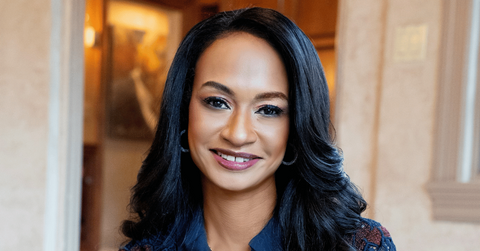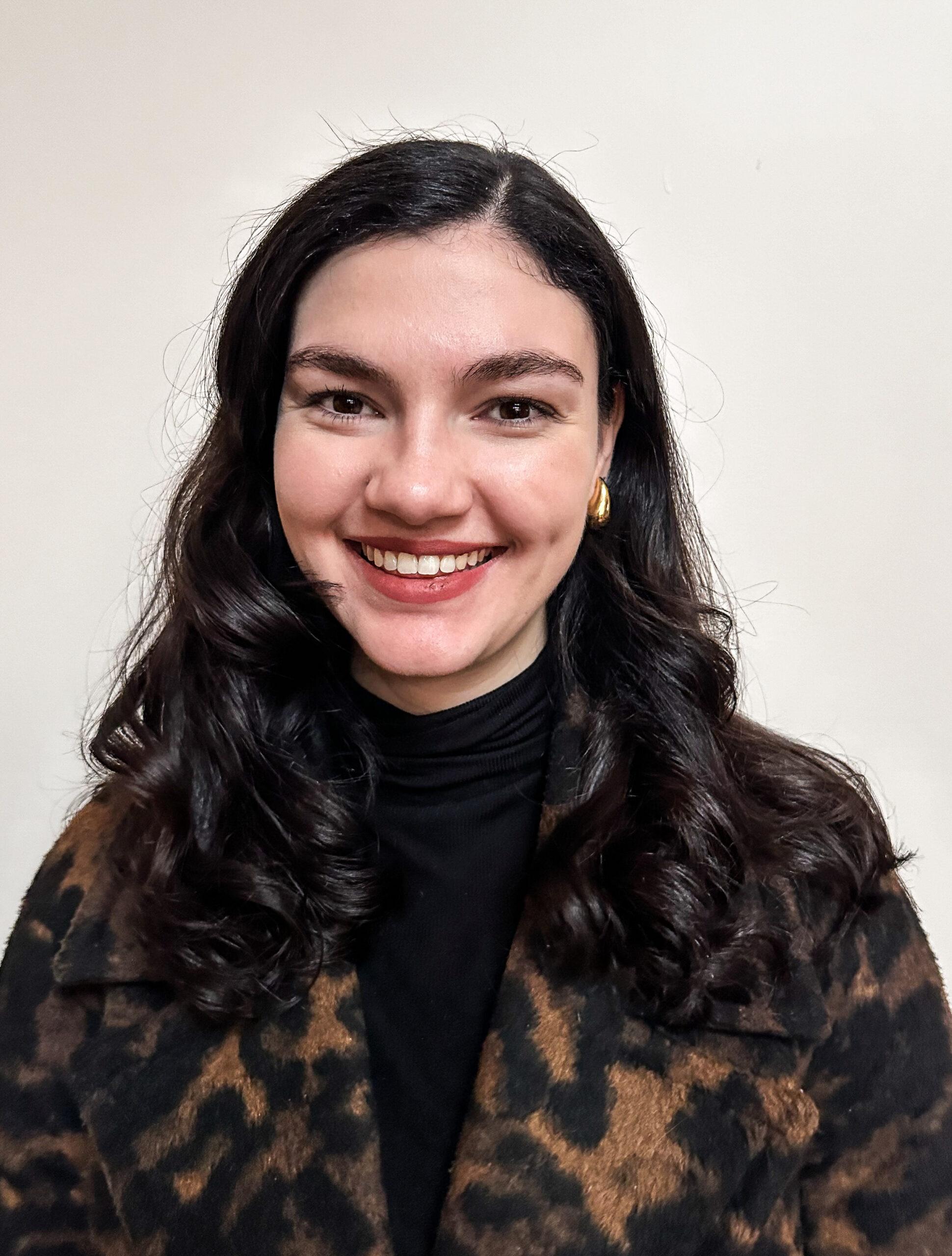According to a study conducted by Staffing Industry Analysts, 61% of the US employee respondents are planning to enhance their current working skills, while an additional 31% are considering it. However, as of 2025, high school education is among the highest levels of academic achievement in nearly 30% of American adults aged 18 and older, per Education Data Initiative. For the rest of American adults who choose to pursue higher education, it’s reported that only 33% of colleges and universities are considered affordable within the US.
In a country where affordable access to opportunity remains uneven, some leaders dedicate their careers to building the bridges that others need to cross. Racquel Oden exemplifies this commitment, seamlessly weaving together 25 years of Wall Street expertise with passionate advocacy for underrepresented communities in education, employment, and beyond. She currently leads as the US Head of Wealth and Personal Banking at HSBC.
Prior to this, Racquel was seated as the Head of National Sales for Consumer Banking and Wealth Management at JPMorgan Chase, and she also took on varying roles in strategy under Merrill Lynch.
As a board member of the Thurgood Marshall College Fund (TMCF) for 16 years, Racquel has also witnessed firsthand the transformative power of education and mentorship. Her journey as a financial services professional and a nonprofit leader reflects a deep understanding that true change requires both technical excellence and unwavering dedication to opening doors for others.
In a conversation with Her Agenda, Racquel shares insights on navigating recent challenges to diversity initiatives, the evolution of historically black colleges and universities (HBCU) support from scholarships to comprehensive leadership development, and how she believes the next generation of innovators will emerge from this access to guidance.
Her Agenda: You’ve had a successful career in finance. What inspired your addition of leadership within the nonprofit and education space?
Racquel Oden: I have been in the financial services industry or on Wall Street for the last 25 years of my life and have always seen the importance and the need for advocacy for women and people of color in this industry over my 25 years.
There are two things that you want to focus on, such as how do you find future talent? And that might explain my endeavors in the Thurgood Marshall College Fund, focusing on HBCU students who traditionally have not always had access to Wall Street. Then, also looking at programs like Prep for Prep. How do we use this as an opportunity for kids who are in underserved communities to go to private schools or to boarding schools, which will really change their trajectory in life? I do believe a lot of this comes down to access. And providing access to women, people of color, and underserved communities is where there are opportunities in our industry.
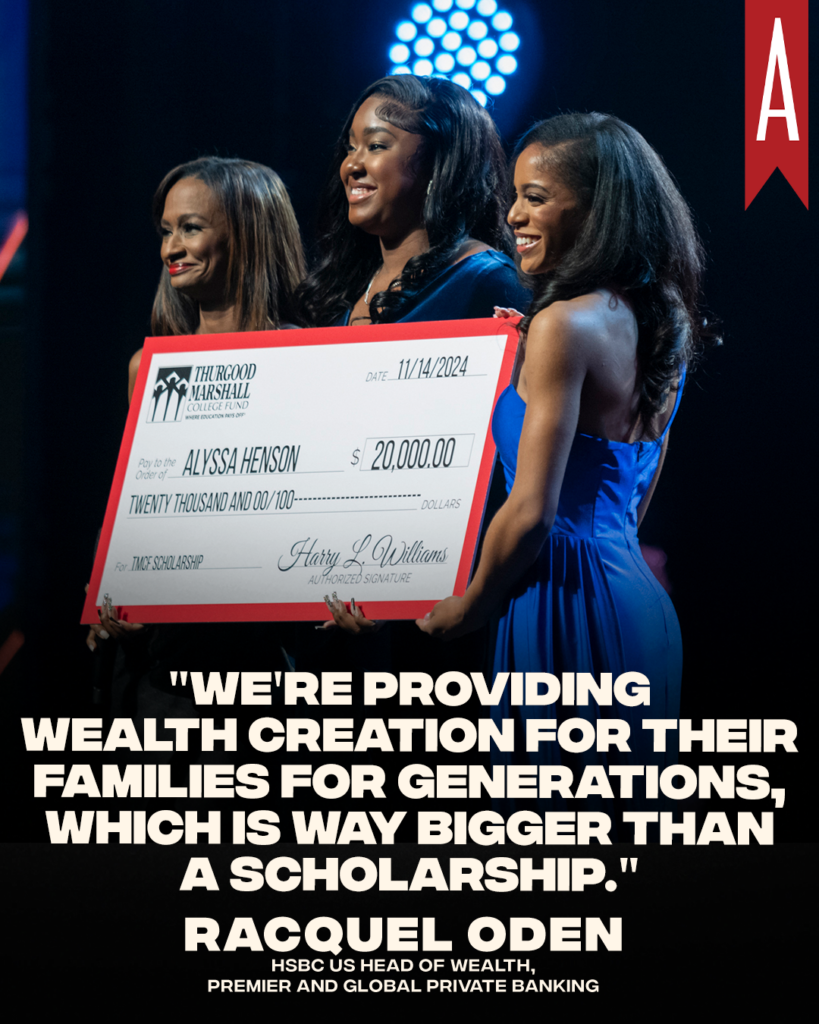
Her Agenda: You’ve served on the TMCF board for 16 years. How have you seen the organization evolve during that time?
Racquel Oden: 16 years…I know every time I hear that, I’m always surprised by that. What you find first is when you find a purpose and you enjoy something that doesn’t feel that long, but I guess it has been that long.
What I found is that the evolution of it is, quite honestly, our pivot from not just providing scholarships. I think when we first started 16 years ago, we had a very strong focus, which is still just as important, of making sure that we provided scholarships. Again, they need access to finances so people can continue their education and afford it. That was an important piece.
But where we evolved on top of that is really around leadership development. The other thing is, once we’ve kept you in school, how do we get you employed at these Fortune 100 and Fortune 500 companies? And so, we spent a lot of time as well on leadership development so that we can help build future leaders, so that they have the opportunity not only to get an education, but really be employed at many of these industries and corporations across the board.
Her Agenda: How do you think recent Supreme Court decisions on affirmative action will affect access to education for students?
Racquel Oden: All of us are navigating these new times and figuring out what the implications are to that. I do think, one, you’ll see with our TMCF organization, we spend a lot of time in Washington continuing to lobby both the Republicans and the Democrats to understand the value of these state-funded HBCUs.
So, just to be very clear, it’s an important aspect of Washington from a federal funding and a state funding standpoint for these schools to exist. And so, I’d say with the changing laws, it’s even more important that we spend time advocating and ensuring that our local legislators understand intent, purpose, and the value HBCUs bring not only to this community, but to their states as a whole.
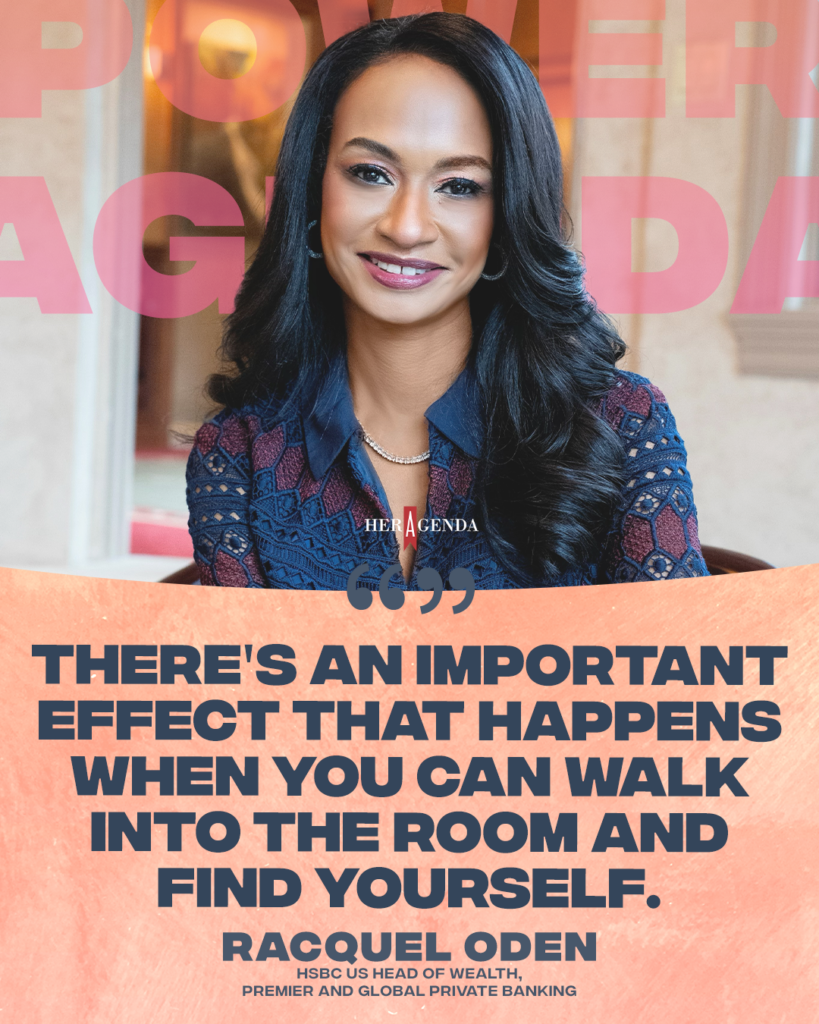
Her Agenda: In light of the backlash into the defunding of DEI programs, what is TMCF’s stance and strategy moving forward?
Racquel Oden: Our schools are open to all students. So, I want to be very clear.
We’ve never been under the bucket of DEI for that reason. So, any race, creed, color, gender can attend an HBCU school. So, there are no targeted programs for DEI or HBCU schools.
There’s no target specifically. So, from a law and policy standpoint, we do not meet the criteria, quote-unquote, of DEI, but the perception is just as important, so that people understand that if you, as a company, invest or commit to this, does this allow you on the agenda? Wherever your company is at this point is based on the new rulings, whether you are able to participate or not. So, we do clearly spend a lot of time to make it clear that we are bipartisan and that all students have access to our HBCU schools, and there is diversity within those schools, and we don’t target any particular segment.
Her Agenda: As a trailblazing woman in finance and non-profit leadership, what barriers have you faced personally, and how have you overcome them?
Racquel Oden: There are two barriers. Sometimes if you don’t see, you don’t believe, right? And so, I always start there.
I truly believe there’s an important effect that happens when you can walk into the room and find yourself, right? And so, that’s not going to happen often in some of these industries. That’s why it’s important to have senior leaders who you can see from other industries and other places to say what’s possible. So, the art of possibilities.
I also think you have to ensure that you look for allyship or mentorship from people who don’t look like you in these places. Because the reality is you’re not going to find yourself in all these places with a level of opulence or a plethora of people who look like you. So, you need to find advocates who may not look like you.
And I’ll have to be very clear in my career, my mentors and advocates absolutely didn’t look like me. If I have the benefit of that happening, which I’ve had that too, it’s amazing. But it’s not often.
Thirdly, it’s about you bringing your full self to the organization because you’re so much better for it. I always tell people never hold back your voice at those tables because your diverse view really matters. And that’s the benefit of them realizing and seeing the body of work is that much better because you are getting different views and perspectives as part of any true, what I call, business decision-making.
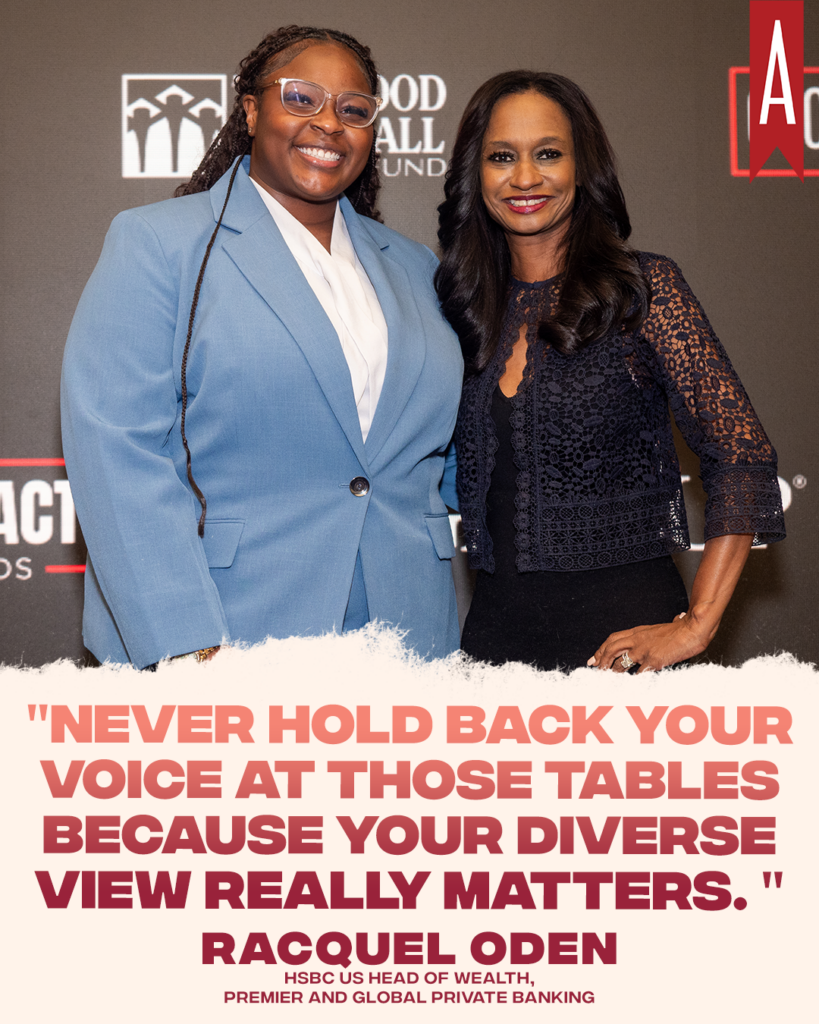
Her Agenda: What is some of the best advice some of your mentors have given to you over the years?
Racquel Oden: I think it just really depends on where you are in your career. I always tell people at a younger part of your career, you’re going to get credit for your technical skills, your depth of knowledge, your ability to do the research, and know the details. People are going to look to you for technical skills and the data, which is great. That’s the value you will provide.
Then you’ll evolve by taking those technical skills and what you know and the data and converting it to what I call strategic views of what we should be doing with it. You start to apply it and give direction to the business. And then the third level of it is you transition to what I call your ability to communicate, inspire, and influence, which is where you get to that senior level as an executive. And so, they’re just kind of the stages you go through, and that’s the advice I always give people.
Depending on what stage you’re in, like being the technical expert, but speak up and take the data and have an opinion and a review. Doesn’t matter if it’s right or wrong; it’s like applying the data is going to be really important. Then you progress to the other part at that level, where I say it’s all about influencing your ability to communicate and inspire others to follow, right? It depends on what side of the pendulum you’re at in your career and at what stage.
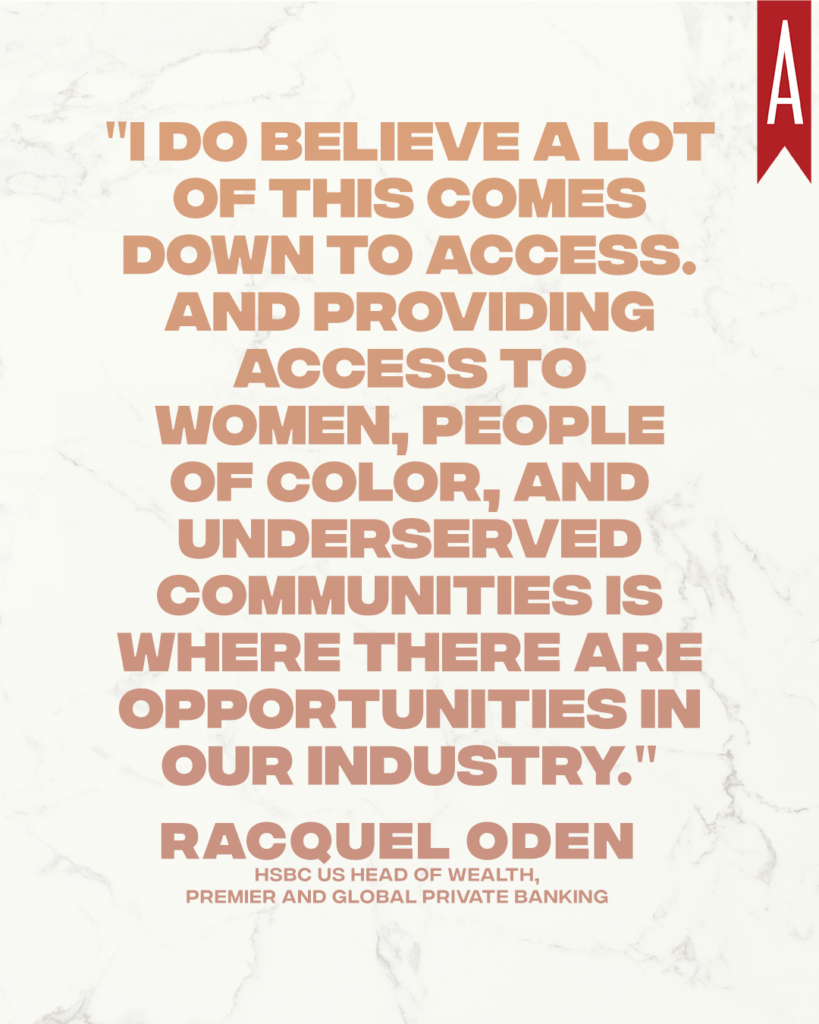
Her Agenda: Where do you hope to see TMCF in the next five years under your leadership and under everybody else’s leadership as well?
Racquel Oden: I hope to continue to see TMCF expand and grow where we’re able to provide 10 times the amount of scholarships to our HBCU students. Where we’re 10 times that of hiring students in corporate or entrepreneurship.
I’m supportive of both. How we and our HBCU students, through Thurgood Marshall, are part of what I call the next phase of what I call the disruptor innovating industries like AI and tech. How do we make sure our students are part of that future workforce? That’s going to look very different, but also being on the entrepreneurial side of it as well as on the executive senior side of it says that when evolution happens, our students are part of it, right? So I’m probably aspiring for the same things everyone is for all universities, but to me, the future is bright based on the next generation that’s coming through all of our universities.
And the benefit of an HBCU just says there’s a place where our students can find themselves and have some level of comfort. But at the same time, everyone’s on the same trajectory of figuring out how to be that next innovator, that next disruptor, and that next senior executive, that’s going to make the United States and the world a better place, because that’s the beauty of education in this country. Bar none, there’s no other country that has the best education system as we do, and the choices and the options of universities, which is why we are a huge recipient of so many other students from around the world coming here to be part of this incredible education system. And I want nothing different than that for HBCUs as well.
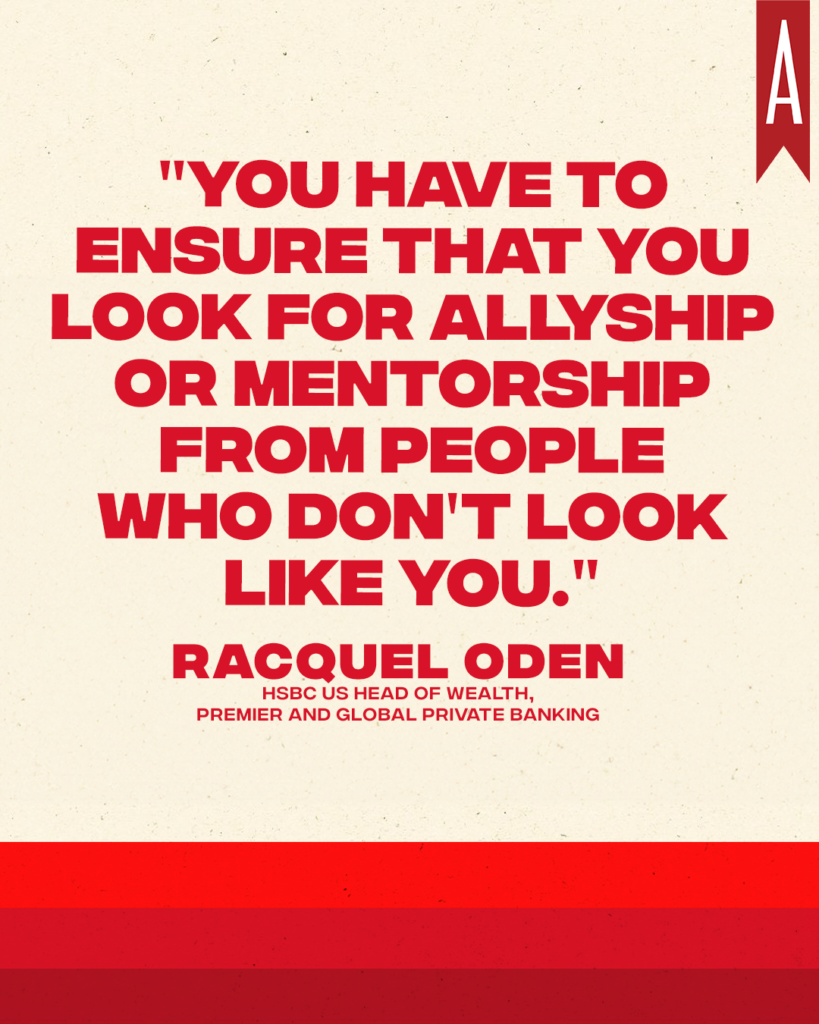
Her Agenda: Can you share a story of a student that benefited from TMCF whose success deeply moved or inspired you?
Racquel Oden: There are so many of them, but the one that I remember most recently, we did a program called HBCU Honors, where they were highlighting the different HBCU schools and the great work they’re doing.
We got to surprise a student that day with a scholarship. And you always forget, like you think about scholarships for needs. You don’t realize that scholarships provide what I consider generational wealth for families.
And there was one student who went to North Carolina State. She was the first in her family to go to college. Her mother literally was saying, ‘I wasn’t going to be able to afford to let her finish.’ And the importance of what that means and changes for generations. And so what seems like a little thing was a huge thing.
And when we handed her the check, the emotion between her and her mother, you know, it’s life or death, like this is what they see it as. And it just means that much more that we are filling the gap, but more importantly, we’re providing wealth creation for their families for generations, which is way bigger than a scholarship.
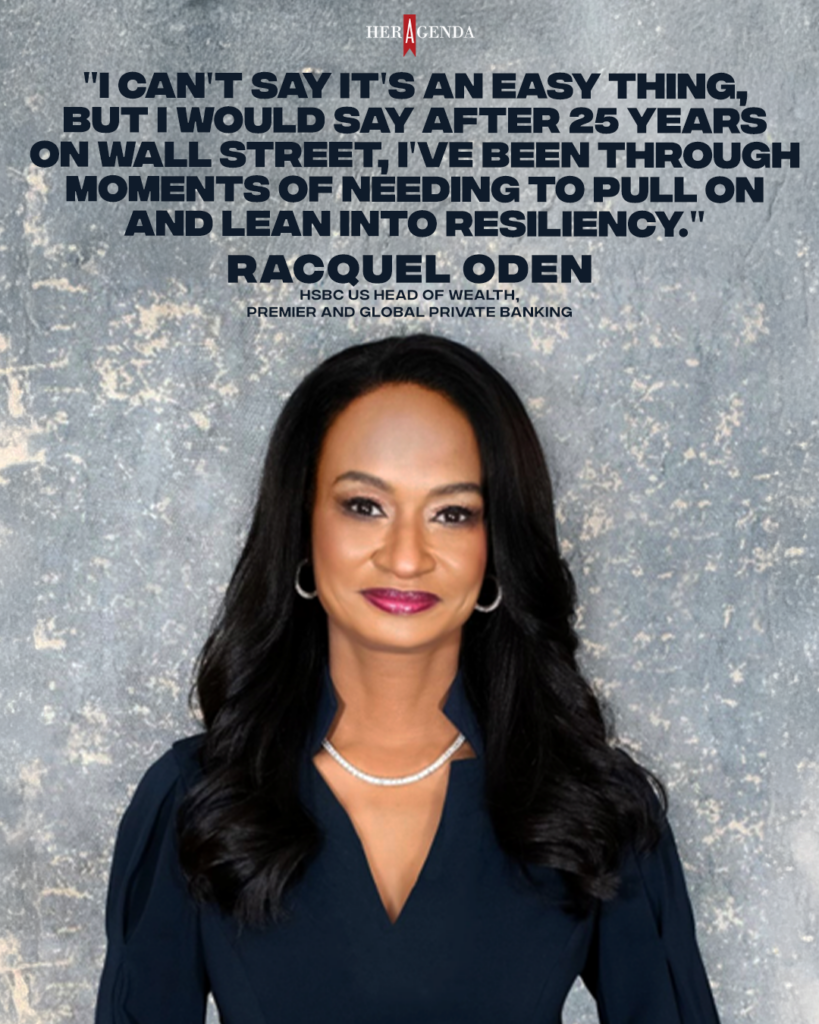
Her Agenda: How do you foster resilience in the face of different systemic challenges, both personally and organizationally?
Racquel Oden: I have a view that is an important attribute that you have to have, especially in today’s day and age: resilience.
I can’t say it’s an easy thing, but I would say [after] 25 years on Wall Street, I’ve been through moments of needing to pull on and lean into resiliency. And that comes with time, but it also comes with what I tell you about our HBCU students, especially what we see through Thurgood Marshall. These are students of the first generation, first timers who didn’t have the dollars, didn’t have the money, needed to outwork everybody to get there.
I’d say the resiliency of our students is why we work so hard to finally take the burden of access from finances or access to leadership development, so that we can support them and what they’ve done, which is having that DNA resiliency of not taking no as an answer and fighting for their spot, but organizations like TMCF being there to support them and fill in the gaps and provide them that piece of access that just isn’t there.
So when you support and give and support TMCF, you’re supporting 80% of HBCU students. And that’s a massive obligation, but the ability to have real impact. I’ll take both sides of that equation.
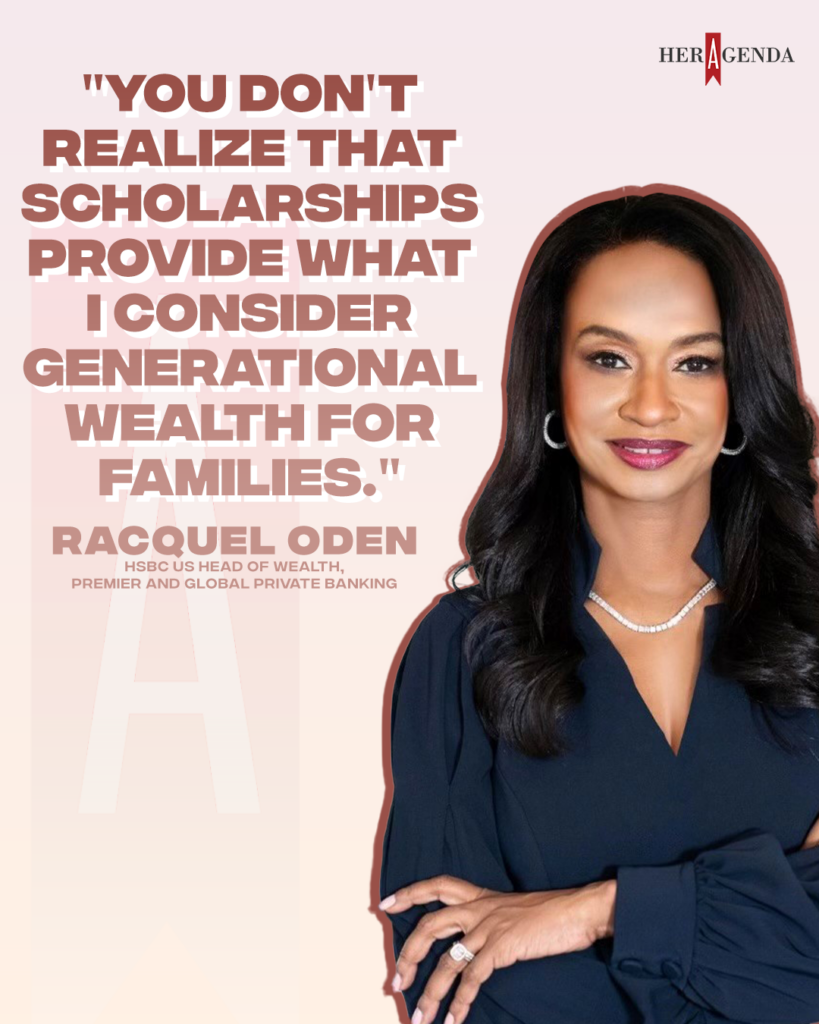
[Editor’s note: This article has been edited for length and clarity.]

